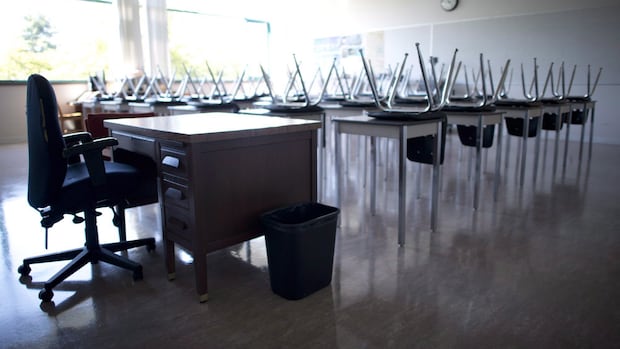With the first day of school just over a week away, educators connected with Yellowknife’s Mildred Hall School say they are worried about what major cuts to support staff — resulting from changes to Jordan’s Principle administration — will mean for students this fall and into the future.
Mildred Hall has used Jordan’s Principle funding for the last eight years. A teacher at the school, who asked not to be named to protect the identities of their students, said this funding paid for staff who provided academic and emotional support, mental health counselling, cultural education and more to children with complex needs.
“We lose a lot of our ability to meet those needs without the funding, and because of that, we will see children’s academic and emotional needs not being met at school,” they said.
In the teacher’s view, losing valuable support staff because no government will step up to pay for them violates Jordan’s Principle — the legal obligation to meet the needs of First Nations children promptly, and to set aside jurisdictional wrangling that could cause disruptions or delays to their care.
In February, the federal government announced broad changes to Jordan’s Principle policy, including that it would no longer fund school-related requests from off-reserve schools, except in certain circumstances.
Following this change in policy, Yellowknife Education District No. 1 (YK1) said in June that it no longer had the Jordan’s Principle funding necessary to keep about 79 of its education assistants (EAs). Across the territory, requests for more than 90 other education assistants under Jordan’s Principle have gone unanswered.
At Mildred Hall, which goes from junior kindergarten to Grade 8, the loss of support staff is expected to be particularly painful.
Last year, Mildred Hall had 29 EAs funded through Jordan’s Principle, according to YK1 assistant superintendent Landon Kowalzik. As of Aug. 18, none had been funded, leaving the school with just 12 EAs.
Indeed, YK1 schools are still waiting to hear whether their applications for Jordan’s Principle funding for the 2025/26 school year have been approved by Indigenous Services Canada (ISC).
Kowalzik said Mildred Hall is also set to lose an additional six positions that were funded through Jordan’s Principle: two academic support teachers, a counsellor, a speech language pathologist, an on-the-land cultural liaison worker and a social emotional learning support worker.
“A lot of our very vulnerable children, especially girls, were very attached to [the social emotional support worker] for a sense of safety and support at school,” said the Mildred Hall teacher.
Sources from Mildred Hall told CBC that they consider the school to have the highest needs of any elementary school in the district. Mildred Hall also has a large number of Indigenous students, they say, but Indigenous or not, students with complex needs have long been drawn to the school because of its culture and education style.
Educators from the school told CBC that the school teaches students with a wide range of needs: there are children who struggle with speech, or use a wheelchair; children who have trouble regulating their emotions, or get scared, and can become explosive and violent; and children who have “invisible” needs, as the Mildred Hall teacher described them, like cognitive disabilities, severe anxiety or complex trauma. From time to time, these children need to go to the library or sit in a quiet place for a while, away from the classroom.
“If there’s only one adult in the room, they’ll never be able to do that because no one will be able to take them,” the teacher said.
Across Mildred Hall, there are children whose literacy and comprehension are years below their grade level, said the teacher, and they need assistance beyond what a sole teacher in their classroom can provide.
EAs support students academically, physically and emotionally. They work with students one-on-one, and can be assigned to multiple students at the same time.
A former Mildred Hall education assistant, who lost their job after the Jordan’s Principle funding changes, spoke of the risks of having too few adults in a classroom. They asked for their name to be withheld because YK1 hadn’t given them permission to speak to the media.
They said a lack of EAs can lead to a situation in which multiple children are having “very large breakdowns” at the same time. These breakdowns can involve children kicking, screaming, throwing things or hitting other children.
“Then the kids who don’t have high needs, and who are just trying to learn, can’t because that’s not conducive to learning at all,” they said.
“I’ve seen in multiple classrooms where kids are having some kind of breakdown, essentially, and the other kids who are trying to learn are just getting distracted and they’re either just staring at the kid or sitting and covering their ears because it’s so loud.”

“I can tell you, education assistants are very busy people,” said Rita Mueller, president of the Northwest Territories Teachers’ Association, which represents YK1 teachers and EAs.
Mueller estimates that without Jordan’s Principle funding, YK1 is set to lose more than half of all the EAs on last year’s roster — a situation she finds “extremely alarming.”
“It is going to have a negative impact on those children, on their families, on the remaining support staff that are going to try to scramble to meet the needs of those children… and on classroom teachers that rely on those other caring adults to be there to support children in the way that they need to be supported,” she said.
N.W.T. schools received $58.6 million through Jordan’s Principle in the 2024/25 fiscal year, according to the territory’s education department. Mueller noted that this money fills critical gaps, and overall “speaks about an underfunded education system that we have.”
What is Jordan’s Principle?
Jordan’s Principle is named after Jordan River Anderson, a boy from Norway House Cree Nation in Manitoba, who was born in 1999 with a number of disabilities. Jordan died in hospital at age 5, never having had the chance to go home, while the governments of Manitoba and Canada argued over who should pay for his home care. Jordan’s Principle is meant to prevent situations like this.
Jordan’s Principle is a legal rule established by the Canadian Human Rights Tribunal that applies to all First Nations children, whether they live on or off a reserve.
Services for other children in Canada are typically the responsibility of their province or territory. Responsibility for services to First Nations children, however, is often shared by federal, provincial or territorial and First Nations governments, which can lead to disputes over who should pay for these services.
Jordan’s Principle is a child-first principle that ensures First Nations children get the services they need without delay while such disputes are resolved.
Under the principle, the first government approached for services will provide them, and any disagreement over who should pay will be sorted out later.
Jordan’s Principle is based on the concept of substantive equality. This means that the governments responsible for services must recognize that as a result of their distinct histories and circumstances, First Nations children may require more or different supports than other children in Canada in order for them to achieve similar outcomes.

Feds say territory responsible for education for all students
In previous years, Mildred Hall has qualified for Jordan’s Principle funding on the basis of the needs of First Nations children and their entitlement to substantive equality. The federal government has not explained how those needs, or substantive equality, will be met at N.W.T. schools, including Mildred Hall, this school year without Jordan’s Principle support. YK1 has simply been told by ISC that its schools’ Jordan’s Principle applications are being reviewed.
Mandy Gull-Masty is the minister of ISC, which is responsible for the administration of Jordan’s Principle. Gull-Masty’s office said she wasn’t available for an interview, and her department did not provide CBC an interview either. However, information was provided in an email from ISC spokesperson Eric Head.
While declaring that the government is committed to Jordan’s Principle, Head said that “Jordan’s Principle has grown at an extremely fast pace,” and pointed to a 367 per cent increase in approved requests between 2021/22 and 2023/24.
Head said that in the territories, territorial governments are responsible for education for all children, including First Nations children. He maintained that the federal government supports education in the territories through federal transfer payments like the Territorial Formula Financing payment.
In responding to questions about the application of Jordan’s principle to address the requirement of substantive equality at YK1 schools, Head said:
“If a First Nations child has a specific health, social or educational need or if it is required by substantive equality, the family can make a request to Jordan’s Principle.
“The determination of a request — whether it is approved or not — is based on the individual needs of each First Nations child and not on the population of Indigenous children.”

Naiomi Metallic is a lawyer from Listuguj Mi’gmaq First Nation in Quebec, and professor at the Schulich School of Law at Dalhousie University, who has written and practiced in the area of Jordan’s Principle.
Metallic said federal transfer payments have never been calculated or negotiated on the basis of meeting substantive equality needs for First Nations, or on Jordan’s Principle.
“This would need to happen for this to be meaningful. Otherwise, it just feels like shoving it off to territory, who will likely shove it off to [the] feds in turn,” she said.
Brittany Matthews, the director of reconciliation and strategic policy at the First Nations Child and Family Caring Society, said Canada is once again trying to narrow the scope of Jordan’s Principle.
“Canada has been ordered to… implement Jordan’s Principle in such a way as to allow for services that might need to be more, or extra, or longer services, like education services, owing to the rights of First Nations children to substantive equality,” she said.

The Family Caring Society has rigorously fought Canada over the proper implementation of Jordan’s Principle. The group, along with the Assembly of First Nations, brought the human rights complaint that led the Canadian Human Rights Tribunal to determine in 2016 that Canada’s interpretation of Jordan’s Principle was discriminatory and too narrow. The decision also made Jordan’s Principle a legal rule.
“The tribunal has made very clear orders on how Canada needs to implement Jordan’s Principle and so has the Federal Court,” said Matthews. “So it’s very confusing to me to see ISC, to see Canada, try to achieve limiting Jordan’s principle through policy, what it could not achieve through litigation.”
Matthews said the tribunal’s orders are binding on Canada, meaning Canada must make sure First Nations children’s needs are being met while jurisdictions work out who will foot the bill.
If ISC believes the Northwest Territories is ultimately responsible for paying for education supports for these children, there are ways for the federal government to be reimbursed for supports that it pays for now, she said.
“It’s really about meeting the needs of kids first and figuring out who’s picking up the tab later.”
N.W.T. doesn’t have cash to fill hole left by Ottawa: education minister
At a public briefing on education supports last Thursday, N.W.T. Education Minister Caitlin Cleveland said her department doesn’t have the money to fill the hole left by the federal government.
In emailed statements, she said: “In many Northern communities, Jordan’s Principle isn’t supplemental — it’s essential. It fills critical gaps and helps ensure Indigenous children get the services they need, when and where they need them. Rolling it back now would put real progress at risk.”
Cleveland said she will keep advocating for the Jordan’s Principle changes to be reversed and for a “regionally tailored approach.” She also said her department is looking at how other N.W.T. government programs can address gaps that emerge.
Metallic, the lawyer and professor, said both federal and territorial governments have a responsibility to ensure First Nations children don’t fall through the cracks.
She said if the N.W.T. and Canada are unwilling to provide services necessary to ensure substantive equality for First Nations children, there are potentially grounds for a complaint to territorial and federal human rights commissions. A judicial review may also be possible.
But none of these steps would bring dozens of EAs back to Mildred Hall in time for the first day of school on Aug. 28.
“It’s hard to believe that this could be real or that we could really run this school with this few adults,” said the Mildred Hall teacher.
They said with Jordan’s Principle support, Mildred Hall has seen “amazing” improvements in literacy over the last few years.
“It’s sad to think that we might be going back downhill now without that support,” they said. “We love our students and we feel very emotionally tied to their well-being and their success.”







